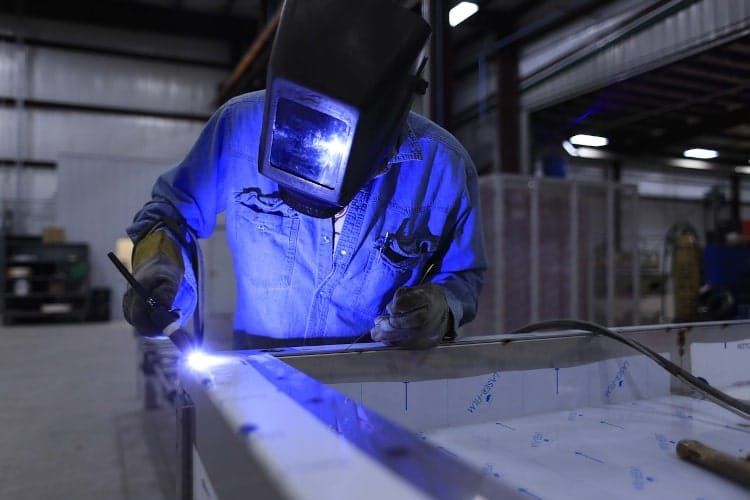What Are Skilled Trades Jobs?

In an employment landscape where it might feel harder than ever to get ahead, it’s no wonder so many people are asking the question, “What are skilled trades jobs?” People want to know what the skilled trades are all about, and for a good reason.
The skilled trades pay well. Really well. And you don’t need a college degree to get one.
That being said, you do need to receive some type of training before you enter the skilled trades. It doesn’t have to be a college degree, but employers in the trades usually won’t hire just anybody.
Let’s take a look at what the skilled trades are all about. We’ll consider types of trades careers, why they’re so in demand, and how you can start training for one.
So, what are skilled trades jobs, you ask? Here are a few examples
The skilled trades are a line of work involving hands-on activities in construction and industrial applications. In other words, trades jobs are jobs where you build things – often really big things like office buildings, homes, roads, bridges, and municipal infrastructure.
Skilled tradespeople hold all sorts of job titles, including:
- Welder
- Carpenter
- Electrician
- Plumber
- HVAC Technician
- Concrete Finisher
- Heavy Equipment Operator
There are dozens of other types of skilled trades jobs, but those are a few you might be familiar with. Many professionals in the skilled trades spend much of their careers outdoors creating built environments for people in their community – everyone from workers to residents to commuters. Everyone, really! If you’ve ever walked into or out of it, you can thank some skilled tradespeople for constructing it.
Of course, almost nobody in the skilled trades can do everything required to see a project through to completion. Instead, tradespeople specialize.
Maybe you’re interested in wiring up buildings and ensuring that all parts of a structure receive the power they need. If so, then a career in electrical contracting might be a good fit.
Or perhaps you’re more interested in keeping heating and cooling systems in working order. That’s what HVAC technicians do; they’re skilled tradespeople, too!
What skilled trades are in demand?
Nowadays, lots of skilled trades are in demand. There simply aren’t enough workers for all of the trades jobs available, and it has been this way for decades.
Construction employers often have to postpone work and spend longer than they’d like to on projects because they don’t have enough trades professionals to do the work. That’s really bad for construction companies. But for you, the potential skilled trades worker, it’s welcome news.
It means that if you train for a career in the skilled trades, you have a very good shot at getting a high-paying job that you love.
Here at Construction Ready, we’re constantly placing graduates of our training program with employers who need:
- Plumbers: With an average annual salary of $73,320, plumbers make a great living working with their hands.
- Electricians: These professionals boast average annual earnings of $59,000 to $65,000, depending on what kind of employer you work for.
- Roofers: As a roofer, you can earn an average of nearly $60,000 per year, depending on where you work and how much experience you have.
Speaking of experience, a big part of earning well in the skilled trades has to do with the amount of time you’ve been on the job. New construction workers often get entry-level jobs – they’ll work as flaggers and/or perform various small tasks on the job site.
The thing about construction, however, is that new workers often advance very quickly and take on more responsibility. It’s common for new construction workers to go from an hourly wage to a salaried position in less than a year on the job! And from there, workers have a lot of room to grow and advance in their chosen trade.
How do you train for skilled trades jobs?
There are three different ways.
The first is to find an apprenticeship. We don’t suggest this option because very few construction companies have true apprenticeship programs. What’s more, most employers aren’t equipped to provide on-the-job training to someone who has no experience. For liability purposes, they also don’t want to let anybody on the job site who hasn’t earned at least a few basic construction safety credentials.
Since an apprenticeship usually isn’t all that realistic, another option is community or technical college. You can investigate whether private trade school is worth it, but public community and technical colleges will usually be more affordable and highly regarded.
Public colleges often have programs in plumbing, electrical contracting, and HVAC. You will need to attend for anywhere from a few months to a couple of years, depending on whether the program culminates in a certificate (usually less time in school) or an associate’s degree (more time in school). Either way, you’re tied up in classes for months at a time and you may have to pay thousands of dollars for the certificate or degree.
For these reasons, a dedicated skilled trades training program is often a better bet. At Construction Ready, we train adult jobseekers from all walks of life to begin careers in the skilled trades. Our flagship program lasts 20 days and is fully funded by government grants and/or private donations.
In other words, you don’t have to pay anything to complete Construction Ready’s program and begin your career.
Since we bring employers to the training for interviews, 97% of our graduates land construction jobs before the training is even over! Remember: skilled tradespeople are in demand. Construction companies know that our graduates are trained and ready for the job site. They like that, which is why they hire our graduates right away.
Get started in the skilled trades
We hope we’ve answered the question, “What are skilled trades jobs?” and that you’ve gotten even more great information than you bargained for when you started reading!
To find out more about Construction Ready and how to begin your career in the skilled trades, sign up for an info session today! We’d love to learn more about you and what you’re looking for in a career.


